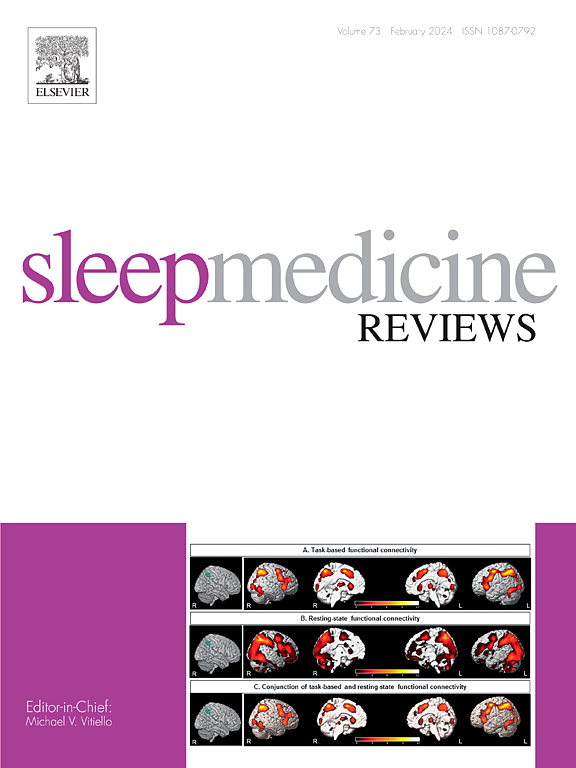Sleep abnormalities in bipolar disorders across mood phases: A systematic review and meta-analysis
IF 11.2
1区 医学
Q1 CLINICAL NEUROLOGY
引用次数: 0
Abstract
Sleep abnormalities are core features of bipolar disorders (BD), but they have not been thoroughly examined across mood phases. This meta-analysis investigated sleep disturbance prevalence and sleep characteristics differences in BD across mood phases. A systematic search through September 2024 identified 44 studies (7614 BD cases, 3164 controls), including 11 prevalence and 34 case-control studies. Poor sleep quality prevalence was 52% during euthymia, and insomnia prevalence was 63% during the depressive phase. Individuals with euthymic BD reported worse sleep quality and objectively measured longer total sleep time and sleep onset latency than controls. Depressive phase BD showed higher rapid eye movement percentages, while manic/mixed phase exhibited shorter total sleep time, lower sleep efficiency, and longer sleep onset latency. During euthymia, BD demonstrated greater variability in sleep duration and continuity, and more prominent sleep differences when assessed with sleep diary versus objective sleep measures, highlighting the importance of integrating objective assessments and patient-reported outcomes. Overall, these findings indicate that poor sleep quality and insomnia are highly prevalent in BD, and that some sleep parameter differences are present during euthymia, while others occur during depressive and manic phases, emphasizing the need for sleep assessments and tailored management throughout the course of BD.
双相情感障碍情绪阶段的睡眠异常:一项系统回顾和荟萃分析
睡眠异常是双相情感障碍(BD)的核心特征,但它们尚未在情绪阶段得到彻底的研究。本荟萃分析调查了双相障碍患者在不同情绪阶段的睡眠障碍患病率和睡眠特征差异。截至2024年9月,系统检索确定了44项研究(7614例BD病例,3164例对照),包括11项患病率研究和34项病例对照研究。精神状态期睡眠质量差的患病率为52%,抑郁期失眠的患病率为63%。心境双相障碍患者报告睡眠质量较差,客观地测量总睡眠时间和睡眠发作潜伏期比对照组更长。抑郁期BD表现出较高的快速眼动百分比,而躁狂/混合期BD表现出较短的总睡眠时间、较低的睡眠效率和较长的睡眠开始潜伏期。在心境愉悦时,双相障碍在睡眠持续时间和连续性方面表现出更大的可变性,当用睡眠日记和客观睡眠测量来评估时,睡眠差异更明显,这突出了将客观评估和患者报告的结果结合起来的重要性。总的来说,这些发现表明,睡眠质量差和失眠在双相障碍中非常普遍,一些睡眠参数差异出现在心境期间,而另一些则出现在抑郁和躁狂阶段,强调了在整个双相障碍过程中进行睡眠评估和量身定制管理的必要性。
本文章由计算机程序翻译,如有差异,请以英文原文为准。
求助全文
约1分钟内获得全文
求助全文
来源期刊

Sleep Medicine Reviews
医学-临床神经学
CiteScore
20.10
自引率
3.80%
发文量
107
期刊介绍:
Sleep Medicine Reviews offers global coverage of sleep disorders, exploring their origins, diagnosis, treatment, and implications for related conditions at both individual and public health levels.
Articles comprehensively review clinical information from peer-reviewed journals across various disciplines in sleep medicine, encompassing pulmonology, psychiatry, psychology, physiology, otolaryngology, pediatrics, geriatrics, cardiology, dentistry, nursing, neurology, and general medicine.
The journal features narrative reviews, systematic reviews, and editorials addressing areas of controversy, debate, and future research within the field.
 求助内容:
求助内容: 应助结果提醒方式:
应助结果提醒方式:


